
Rare Disease Education: Fibromuscular Dysplasia
Editor: Kelsey LaFayette, DNP, RN, FNP-C
"When you hear hoofbeats, think of horses, not zebras,” is a common saying in medical education that means you should think of common conditions first, instead of rare ones, in making a diagnosis. “Rare” is a relative term though and about 7,000 rare, or "zebra," conditions affect more than 350 million individuals worldwide. Although these conditions collectively affect an enormous number of people, each of these conditions individually is rare enough that it can be difficult to secure the resources to study them and to develop treatments and cures. Likewise, awareness of rare conditions may be low and health care professionals may not be familiar with their signs and symptoms making it more difficult to reach a correct diagnosis and provide effective treatments.
To increase knowledge about rare conditions, Osmosis and the National Organization for Rare Diseases (NORD) have collaborated on an initiative to bring education and awareness to the public. We are excited to be a part of this initiative because we believe everyone deserves quality health care, no matter how rare their condition.
Zebra of the Week: Fibromuscular Dysplasia
There’s a saying that goes “straight roads don’t make good drivers”. There are many ways and contexts to interpret it, especially in the context of overcoming challenges, but one place where “straight roads” are definitely preferred is the path our blood vessels make throughout the body. Changes in blood vessel architecture can cause significant disruptions just as sudden narrowings or bumps disrupt flow on the road.
Fibromuscular dysplasia is a vascular disorder that causes arteries in the body to develop an abnormal vessel wall structure. This results in a “string of beads” appearance with narrowings and bulges instead of a uniform cylinder. Symptoms depend on the artery affected. For instance, if the carotid arteries that supply blood to the brain are affected, symptoms can include chronic headaches, dizziness, neck pain, or a swooshing sound in the ears. In some cases, patients may experience a transient ischemic attack or stroke. If the renal artery is affected, symptoms may include high blood pressure, flank pain, or abdominal bruit, a swishing sound that can be heard with a stethoscope.
Although its direct cause is unknown, fibromuscular dysplasia is far more common in females than in males, resulting in a theory that hormones may play an important role in disease development.
To learn more about the diagnosis and treatment of fibromuscular dysplasia, watch the dedicated Osmosis video on YouTube and Osmosis.org
Meet Lisa Garner
Lisa Garner is a social worker that had two meetings lined up with people who were reported to be aggressive. She was apprehensive and when symptoms started to show, she thought she was experiencing anxiety. However, when her chest discomfort, along with arm and jaw pain persisted, she went to the ER where she was, surprisingly, diagnosed with a heart attack. As a woman under the age of 50, it was her underlying fibromuscular dysplasia that predisposed her. Watch her tell her story above.
Organization Taking Strides
Since 2003, the Fibromuscular Dysplasia Society of America (FMDSA) has been a non-profit patient advocacy organization dedicated to improving the diagnosis and treatment of fibromuscular dysplasia by acting on several fronts.
On the research side, the society maintains a robust, productive research network and holds an annual conference to foster mutual support between fibromuscular dysplasia stakeholders. In partnership with the University of Michigan, they founded a patient registry to provide researchers with the appropriate pool of patients. The registry grows every year and has become an important resource. They also actively participate in medical and scientific conferences across the country.
On the awareness and education side, they maintain up-to-date, relevant learning material on their website aimed to educate patients and their families. They also have clear resources for physicians to support them in the care they provide. Moreover, the FMDSA is active in campaigns and events on the ground such as their participation in the Cleveland Marathon, Rare Disease Day fundraisers, and May awareness months.
In 2020, they received the Global Genes “Champion of Hope” award for their continued efforts. To learn more about them and what you can do to help, visit their website.
